-
 Bitcoin
Bitcoin $115200
-2.68% -
 Ethereum
Ethereum $3601
-5.16% -
 XRP
XRP $3.035
-2.96% -
 Tether USDt
Tether USDt $0.9997
-0.04% -
 BNB
BNB $764.5
-5.43% -
 Solana
Solana $168.1
-5.92% -
 USDC
USDC $0.9998
-0.02% -
 Dogecoin
Dogecoin $0.2090
-4.80% -
 TRON
TRON $0.3272
-0.49% -
 Cardano
Cardano $0.7306
-5.00% -
 Hyperliquid
Hyperliquid $39.16
-12.22% -
 Stellar
Stellar $0.3967
-4.96% -
 Sui
Sui $3.566
-5.95% -
 Chainlink
Chainlink $16.55
-6.57% -
 Bitcoin Cash
Bitcoin Cash $552.3
-3.90% -
 Hedera
Hedera $0.2516
-4.69% -
 Avalanche
Avalanche $21.99
-5.75% -
 Toncoin
Toncoin $3.621
-0.28% -
 Ethena USDe
Ethena USDe $1.000
-0.03% -
 UNUS SED LEO
UNUS SED LEO $8.951
0.02% -
 Litecoin
Litecoin $105.9
-3.59% -
 Shiba Inu
Shiba Inu $0.00001232
-5.00% -
 Polkadot
Polkadot $3.640
-5.55% -
 Uniswap
Uniswap $9.048
-7.03% -
 Monero
Monero $301.8
-1.51% -
 Dai
Dai $0.9999
-0.01% -
 Bitget Token
Bitget Token $4.334
-3.66% -
 Pepe
Pepe $0.00001064
-6.17% -
 Cronos
Cronos $0.1367
-5.78% -
 Aave
Aave $259.2
-4.59%
Differences between Hot Wallets and Cold Wallets: How to Choose the Best Storage Method?
Hot wallets offer convenience for frequent crypto transactions but are less secure; cold wallets provide superior security for long-term storage but are less accessible.
Apr 19, 2025 at 06:35 pm
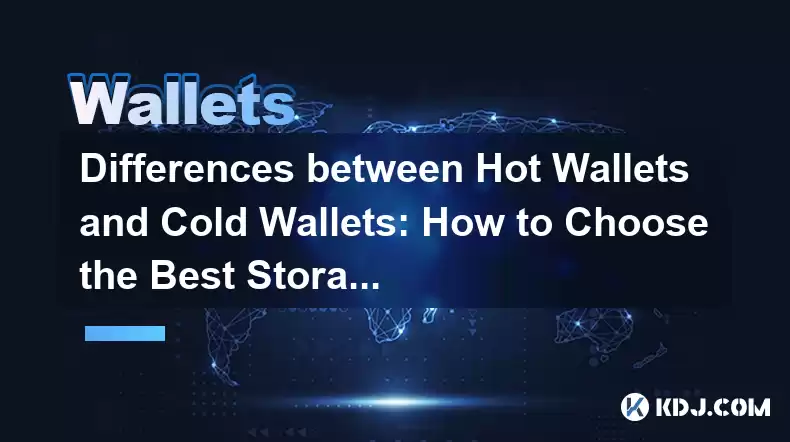
In the world of cryptocurrencies, securing your digital assets is paramount. One of the key decisions you'll face is choosing between hot wallets and cold wallets. Understanding the differences between these two types of wallets, and knowing how to select the best storage method for your needs, can significantly impact the safety and accessibility of your cryptocurrencies. This article delves into the specifics of hot and cold wallets, their advantages and disadvantages, and provides guidance on how to choose the most suitable option.
What Are Hot Wallets?
Hot wallets are digital wallets that are connected to the internet. They are designed for the frequent trading and management of cryptocurrencies. Because they are online, hot wallets offer high convenience and ease of use, making them ideal for everyday transactions.
Hot wallets come in various forms, including software wallets installed on your computer or mobile device, and web-based wallets accessible through a browser. Examples of popular hot wallets include Metamask, Trust Wallet, and Coinbase Wallet.
The primary advantage of hot wallets is their accessibility. You can quickly send and receive cryptocurrencies, making them suitable for those who need to actively trade or use their digital assets. However, this constant connection to the internet also makes them more vulnerable to hacking and cyber attacks. As a result, hot wallets are generally considered less secure than their cold counterparts.
What Are Cold Wallets?
Cold wallets, on the other hand, are offline storage solutions for cryptocurrencies. They are not connected to the internet, which significantly reduces the risk of hacking and unauthorized access. Cold wallets are ideal for storing large amounts of cryptocurrencies that you do not need to access frequently.
There are two main types of cold wallets: hardware wallets and paper wallets. Hardware wallets are physical devices that store your private keys offline. Popular hardware wallets include Ledger and Trezor. Paper wallets involve printing out your private keys and public addresses on a piece of paper, which you then store in a secure location.
The primary advantage of cold wallets is their security. Because they are not connected to the internet, they are much less susceptible to cyber attacks. However, this increased security comes at the cost of convenience. Accessing your cryptocurrencies stored in a cold wallet can be more cumbersome and time-consuming compared to using a hot wallet.
Comparing Hot and Cold Wallets: Key Differences
When comparing hot and cold wallets, several key differences stand out:
- Security: Cold wallets are generally more secure than hot wallets due to their offline nature. Hot wallets, being connected to the internet, are more vulnerable to hacking.
- Convenience: Hot wallets offer greater convenience and ease of use, making them suitable for frequent transactions. Cold wallets, while more secure, can be less convenient to use.
- Accessibility: Hot wallets allow for quick and easy access to your cryptocurrencies, while cold wallets require more steps to access your funds.
- Cost: Hot wallets are often free or low-cost, whereas cold wallets, particularly hardware wallets, can involve a significant upfront investment.
How to Choose the Best Storage Method?
Choosing the best storage method for your cryptocurrencies depends on several factors, including your security needs, trading frequency, and budget. Here are some considerations to help you make an informed decision:
- Evaluate Your Security Needs: If you are holding large amounts of cryptocurrencies for the long term, a cold wallet might be the best choice due to its superior security. For smaller amounts that you use frequently, a hot wallet could be more suitable.
- Consider Your Trading Frequency: If you are an active trader who needs to access your cryptocurrencies frequently, a hot wallet's convenience is likely more important. For those who buy and hold, a cold wallet's security is paramount.
- Assess Your Budget: Hot wallets are often free or low-cost, making them accessible to everyone. Cold wallets, especially hardware wallets, can be more expensive but offer enhanced security.
- Understand the Risks: Both hot and cold wallets come with their own set of risks. Hot wallets are more susceptible to hacking, while cold wallets can be lost or damaged. Understanding these risks can help you mitigate them.
Practical Tips for Using Hot and Cold Wallets
Whether you choose a hot wallet, a cold wallet, or a combination of both, here are some practical tips to help you manage your cryptocurrencies effectively:
- Use a Combination of Wallets: Many cryptocurrency users find that using both a hot wallet for daily transactions and a cold wallet for long-term storage offers the best balance of security and convenience.
- Enable Two-Factor Authentication (2FA): For hot wallets, enabling 2FA adds an extra layer of security, making it harder for hackers to access your funds.
- Regularly Update Your Wallets: Keep your wallet software up to date to protect against known vulnerabilities. This applies to both hot and cold wallets.
- Backup Your Wallets: Always create backups of your wallet's recovery phrases or private keys. Store these backups in a secure location, preferably offline.
- Be Wary of Phishing Scams: Be cautious of phishing attempts that try to trick you into revealing your private keys or recovery phrases. Always verify the authenticity of any communication or website before entering sensitive information.
Frequently Asked Questions
Q: Can I transfer funds between a hot wallet and a cold wallet?
A: Yes, you can transfer funds between a hot wallet and a cold wallet. To move funds from a cold wallet to a hot wallet, you will need to connect your cold wallet to the internet temporarily, initiate the transfer, and then disconnect it again for security. Conversely, transferring from a hot wallet to a cold wallet involves sending the funds to the cold wallet's public address.
Q: How do I recover my funds if I lose my cold wallet?
A: If you lose your cold wallet, you can recover your funds using the recovery phrase or private keys that you should have backed up. It's crucial to store these backups securely and offline to prevent unauthorized access. If you have not backed up your recovery phrase or private keys, unfortunately, your funds may be irretrievable.
Q: Are there any fees associated with using hot and cold wallets?
A: Hot wallets may have associated fees, such as transaction fees when sending cryptocurrencies or fees charged by the wallet provider for certain services. Cold wallets typically do not have ongoing fees, but you may incur a one-time cost to purchase a hardware wallet. Additionally, when transferring funds to or from a cold wallet, you will need to pay the standard network transaction fees.
Q: Can I store multiple types of cryptocurrencies in one wallet?
A: Yes, many hot and cold wallets support multiple cryptocurrencies. For example, hardware wallets like Ledger and Trezor support a wide range of cryptocurrencies, allowing you to store Bitcoin, Ethereum, and many others in a single device. Similarly, software wallets like Metamask and Trust Wallet also support multiple cryptocurrencies, making them versatile options for managing your digital assets.
Disclaimer:info@kdj.com
The information provided is not trading advice. kdj.com does not assume any responsibility for any investments made based on the information provided in this article. Cryptocurrencies are highly volatile and it is highly recommended that you invest with caution after thorough research!
If you believe that the content used on this website infringes your copyright, please contact us immediately (info@kdj.com) and we will delete it promptly.
- Navigating the Crypto Market: Bitcoin, Trader Experience, and Avoiding the Noise
- 2025-08-02 00:50:12
- Deep Agents, AI Task Management, and Evolution AI: A New Era?
- 2025-08-02 00:50:12
- SPX6900, BlockDAG, and Miner Sales: A New York Minute on Crypto Trends
- 2025-08-01 23:30:15
- BlackRock, XRP ETF, and Ripple: Is the Perfect Storm Brewing?
- 2025-08-01 22:50:11
- Solana ETF Momentum Builds: Will SOL Join the Institutional Party?
- 2025-08-02 00:10:15
- Cardano (ADA) Breakout Watch: Is the Sleeper About to Wake Up?
- 2025-08-02 00:10:16
Related knowledge
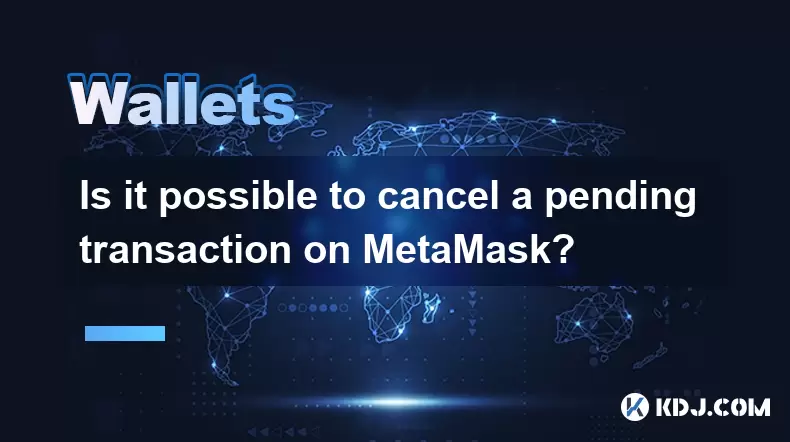
Is it possible to cancel a pending transaction on MetaMask?
Aug 02,2025 at 12:28am
Understanding Pending Transactions in MetaMaskWhen using MetaMask, a popular cryptocurrency wallet for Ethereum and EVM-compatible blockchains, users ...

How to handle "internal transactions" in Coinbase Wallet?
Aug 01,2025 at 11:21pm
Understanding Internal Transactions in Coinbase WalletInternal transactions in Coinbase Wallet refer to movements of assets that occur between address...
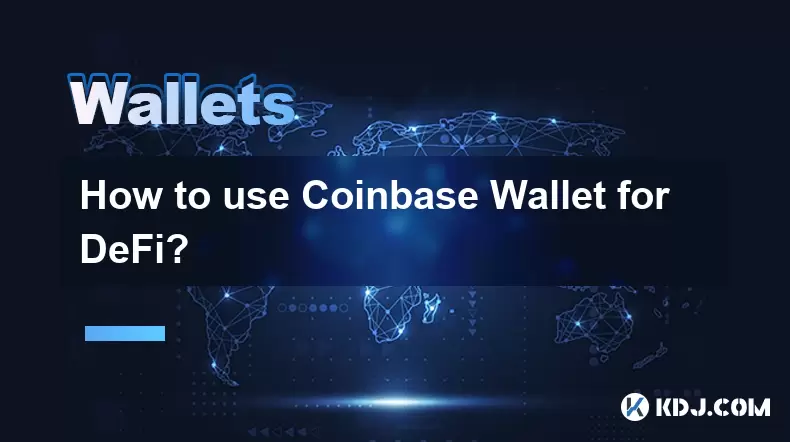
How to use Coinbase Wallet for DeFi?
Aug 01,2025 at 11:43pm
Understanding Coinbase Wallet and Its Role in DeFiThe Coinbase Wallet is a self-custody cryptocurrency wallet that allows users to store, send, receiv...

How to link my Coinbase account to my Coinbase Wallet?
Aug 01,2025 at 10:50pm
Understanding the Difference Between Coinbase and Coinbase WalletBefore linking your Coinbase account to your Coinbase Wallet, it's essential to under...
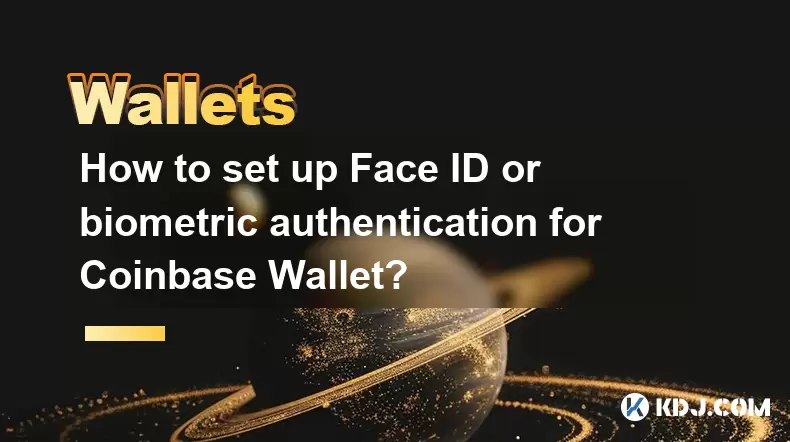
How to set up Face ID or biometric authentication for Coinbase Wallet?
Aug 01,2025 at 11:35pm
Understanding Biometric Authentication in Coinbase WalletBiometric authentication in Coinbase Wallet enhances security by allowing users to access the...
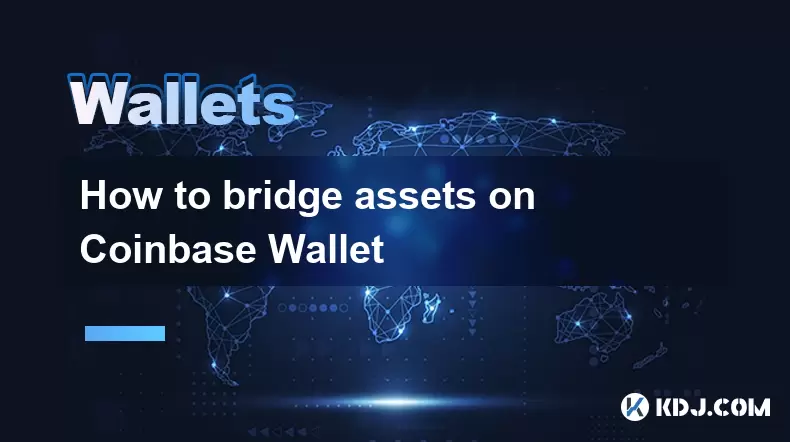
How to bridge assets on Coinbase Wallet
Jul 27,2025 at 01:14am
What Is Asset Bridging in the Context of Coinbase Wallet?Bridging assets refers to the process of transferring tokens from one blockchain network to a...

Is it possible to cancel a pending transaction on MetaMask?
Aug 02,2025 at 12:28am
Understanding Pending Transactions in MetaMaskWhen using MetaMask, a popular cryptocurrency wallet for Ethereum and EVM-compatible blockchains, users ...

How to handle "internal transactions" in Coinbase Wallet?
Aug 01,2025 at 11:21pm
Understanding Internal Transactions in Coinbase WalletInternal transactions in Coinbase Wallet refer to movements of assets that occur between address...

How to use Coinbase Wallet for DeFi?
Aug 01,2025 at 11:43pm
Understanding Coinbase Wallet and Its Role in DeFiThe Coinbase Wallet is a self-custody cryptocurrency wallet that allows users to store, send, receiv...

How to link my Coinbase account to my Coinbase Wallet?
Aug 01,2025 at 10:50pm
Understanding the Difference Between Coinbase and Coinbase WalletBefore linking your Coinbase account to your Coinbase Wallet, it's essential to under...

How to set up Face ID or biometric authentication for Coinbase Wallet?
Aug 01,2025 at 11:35pm
Understanding Biometric Authentication in Coinbase WalletBiometric authentication in Coinbase Wallet enhances security by allowing users to access the...

How to bridge assets on Coinbase Wallet
Jul 27,2025 at 01:14am
What Is Asset Bridging in the Context of Coinbase Wallet?Bridging assets refers to the process of transferring tokens from one blockchain network to a...
See all articles

























































































